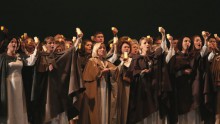To mark the 75th anniversary of the Babyn Yar tragedy, Kyiv’s National Opera has staged a theatricalized concert of sacred music organized with support from the Ukrainian-Canadian cultural initiative “Ukrainian-Jewish Encounter.” This cultural and educational institution has rather a wide range of activities, including the international conference on the oral history and consequences of World War Two held in Berlin and Potsdam in 2011 in connection with the 70th anniversary of Babyn Yar. The conference, which was organized with support from the Konrad Adenauer Foundation, was participated by about 60 academics from Canada, Ukraine, the US, the Netherlands, Germany, France, Israel, and the UK. This forum, which heard some prominent scholars, artists, and public activists, was aimed at promoting mutual understanding between the Jewish and Ukrainian people.
The requiem concert showed artists from all over the world, including the Hamburg Symphony Orchestra, the Dumka National Chorus, and soloists from Canada, Britain, Israel, and Germany. The music was conducted by a young talented Oksana Lyniv who began her career at the Lviv Theater of Opera and Ballet, then worked with the best-known European orchestras, and is now a conductor at Munich’s Bavarian State Opera.
The program consisted of the Aramaic prayer “Kol Nidre” (“All Vows”), an opus for cello and orchestra by Max Bruch played by the superb Canadian musician Roman Borys, Kaddish requiem “Babyn Yar” by Yevhen Stankovych, and Johannes Brahms’ “German Requiem” performed by the Dumka Chorus and the soloists Gal James (soprano, Israel), Benjamin Butterfield (tenor, Canada), and Pavlo Hunka (bass-baritone, UK). Annechien Koerselman from the Netherlands was the stage director.
The renowned Hamburg Symphony Orchestra, now consisting of 160 musicians from 15 countries (!) offered the audience the true feast of a harmonious, timbre-balanced, voluminous sound which remains clear even in the abruptly dissonant moments of the performed pieces.
Choosing the music works to pay tribute to one of the 20th century’s most horrible tragedies, the producer Pavlo Hunka was guided by two criteria: they should be directly linked to the theme and, like Brahm’s “German Requiem” created almost a century before Babyn Yar, carry a hope to all those who suffered in all times.







